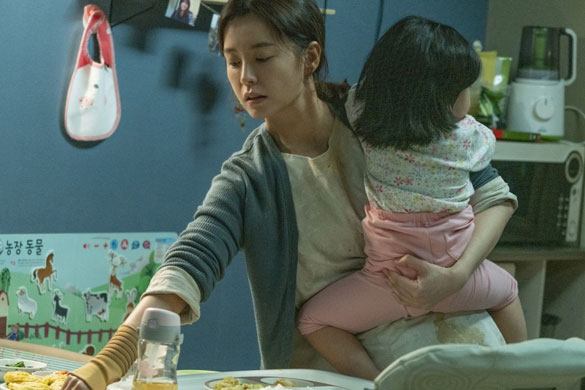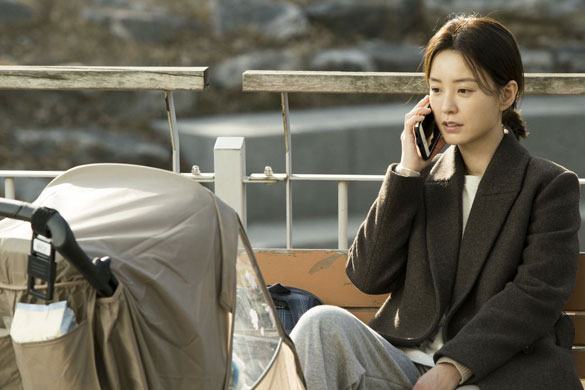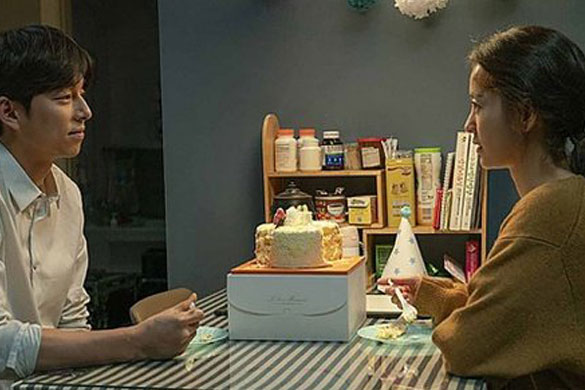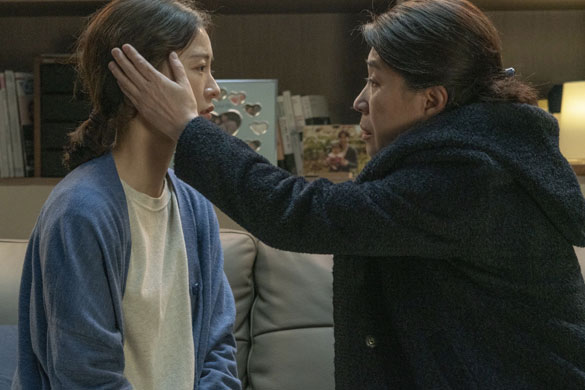
 |
||||
Ji-young (Jung Yu-mi) is a wife and mother who gave up a career in publicity to become a full-time stay-at-home mom and homemaker when her daughter was born. However, though she loves her child deeply, as any parent should, she has increasingly been suffering from periods of deep depression and indeed bouts of anger, her sheer and constant exhaustion pushing her ever closer to physical ill health. Not only that, but her husband, Dae-hyun (Gong Yoo), claims that at times at night she appears to be someone else entirely with a wholly different personality (not least her late grandmother), periods Ji-young has no recollection of the following day.
Review: Historically, in traditional Korea huge importance was given to the family unit, its stability perceived as inherent to the fortitude of society as a whole. Korea was, of course, a wholly patriarchal society with ideas and ideals of male dominance and indeed female subservience virtually sewn in the very fabric of traditionalism, being seen as vital for both societal strength and cultural steadfastness. As such, female autonomy, voracious sexuality outside marriage (and indeed ‘supposed' male ensnarement by such), and even the lure of commercialism (i.e. the draw of modernity) were virtually guaranteed to be viewed from a negative and societal undermining perspective. In terms of the aforementioned all-important family unit specifically, wherever a single woman was in life, personally and/or professionally, she was pretty much expected to see finding a husband and starting a family as an absolute priority and on doing so not only was she routinely required put aside her own hopes, dreams, endeavours and thoughts of career in favour of serving the needs of her husband (foremost) and family, the implication more often than not being that doing so would give her the only life that would allow her to be ultimately truly happy and feel wholly fulfilled. Jump forward to the present day and though in recent years there has been a gradual move towards an acceptance of female autonomy and even the choice of career over or alongside family and motherhood (albeit grudgingly from certain demographics, some even citing this as one of the major factors behind the falling birth rate), the gender gap remains nonetheless and still shows itself in no uncertain terms in women’s personal, familial and/or professional lives on almost a daily basis. It could even be said that this inequality is further perpetuated not least by attitudes of males favoured by and favouring what patriarchy allows from their perspective in position, word and deed that they are loathe to relinquish (just consider the torrent of male verbal abuse Cho Nam-ju's novel of the same name – on which the film is based – faced on its release in 2016, up in arms (and you can read into that ‘threatened’) male comments largely sitting between wholly sexist and disgracefully misogynistic) but even to a degree also ‘allowed’ to continue by a contingent of the older generation (including females), indoctrinated into traditionalism in their own youth and resistant to modernising change.
Typical gender roles within the Korean family unit are pointed to quietly in the early stages of Kim Ji-young: Born 1982. By their very nature patriarchal by implication, these stand as almost a repeated ‘it is what it is’ statement, whether you consider Ji-young and her mother-in-law pretty much constantly preparing food (Ji-young having been roped into helping without any overt request) while the men of the family sit around idly; look at the stereotype reinforcing of her mother-in-law gleefully giving Ji-young (of course) a cooking apron as a gift; or read between the lines of the mother-in-law’s declaration that Dae-hyun is “such a good son" when he starts to wash a few dishes, Ji-young by contrast having toiled tirelessly in the kitchen without thanks or comment at all in spite of clearly not being in the best of health. However, as the narrative progresses, blinkered attitudes, demeaning male opinions and statements become more overt and vocal, present day scenes juxtaposed with flashbacks into Ji-young’s past – whether her high school days or her pre-motherhood life as a career professional. Combine her (earlier) publicity company’s CEO's deeply sexist and condescending statements on women and mothers to a (highly skilled) female manager with Ji-young being passed over for promotion because of the belief she’ll one day need to take maternity leave – and note it’s the female employees who are required to make tea for a boardroom meeting before attending it themselves; take into account Ji-young’s mother revealing that in her youth she had to abandon any hope of furthering her education to get a job to earn money to ensure her male siblings could attend college; listen to a disgraceful comment from one of Dae-hyun’s present day colleagues that “Any woman with mental health issues is obviously a psycho b*tch"; look at the male high school student deliberately standing inappropriately close to (young) Ji-young on a train and following her as she leaves, clearly with something sexual on his mind (a present day scene of similarly inappropriate closeness from a stranger sparking the flashback); or consider female employees at the publicity company finding a spycam in the women’s toilet and later discovering pictures from it have been put online (on discussing the shocking incident and its perpetrator, one of Ji-young’s female colleagues states “When I think of that b*stard, all I see is my ass!” as well as considering the #MeToo revealing of shocking sexual misconduct against women in very recent times, and as far as I’m concerned these and yet more depicted examples of societal injustices against women past and present allow Kim Ji-young: Born 1982 to resolutely state that though the position of women in Korean society has moved forward and strengthened over the years, to a degree the more things have changed the more they’ve stayed the same. Not only that, but the film and indeed the novel on which it’s based lay blame largely at the feet of outdated patriarchal male attitudes and society’s failure to adequately address them.
As already stated, the 2016 release of Cho Nam-ju’s novel caused a fierce sexism/gender storm in Korea which Kim Do-young’s film was virtually guaranteed to rekindle. A certain male demographic (I would say anti-feminist but I question if they’d be willing to admit that even to themselves) loudly and vehemently claimed that the story’s male characters were nothing more than inaccurate stereotypes. However, (and I say this as a male myself) Kim Ji-young: Born 1982 is right and those men are frankly wrong, to my mind their patriarchal outcries coming as a direct result of the narrative forcing them to look into a none too flattering mirror, one that blinkered denial makes them loathe to do.
KIM JI-YOUNG: BORN 1982 (82년생김지영) / 2019
|
||||
All images © Lotte Entertainment Review © Paul Quinn |
||||



